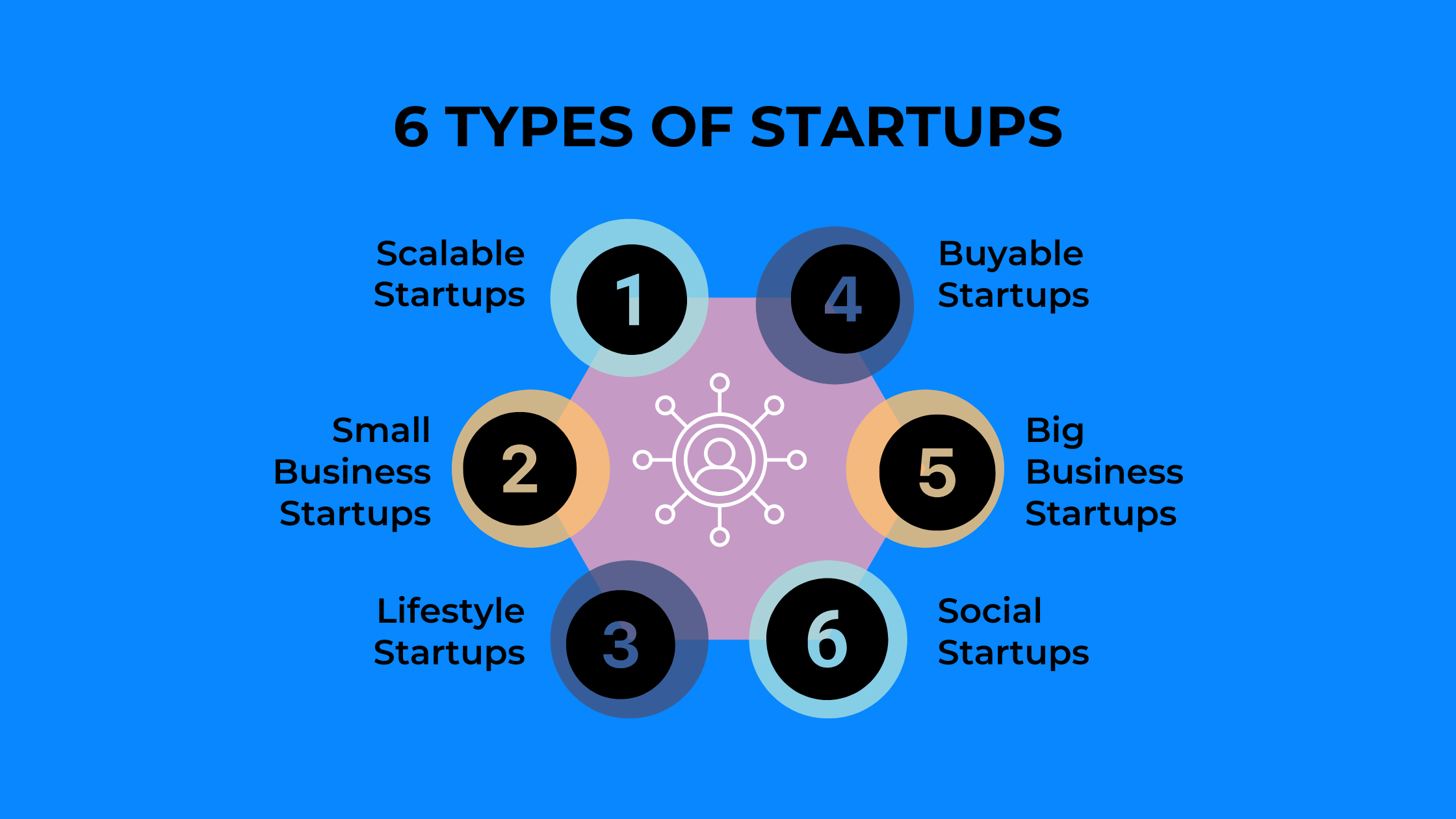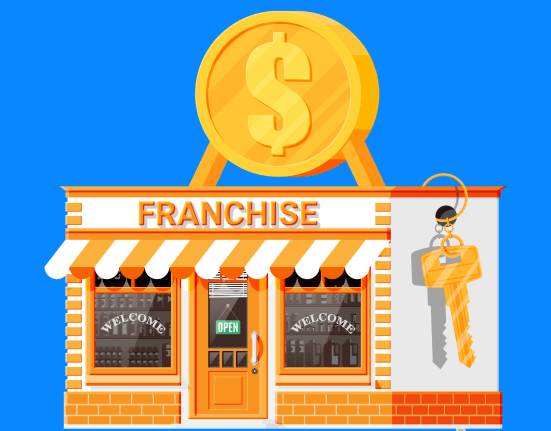We all dream about starting a business but when it comes to choosing the startup idea, we go quiet. The reason is—we don’t know much about the space. Most of us are unaware of the types of startups, stages of startups, how to get startup funding, and more.
While we have already talked about funding and stages in our previous articles, in this article, we’ll talk about the types of startups in India. Knowing the different types of startups can help you choose the path that fits your goals and vision.
Whether you’re looking to scale quickly or follow a passion, there’s a startup type for you. In this article, we’ll explore six types of startups you should know about. Those are –
- Scalable startups
- Small business startups
- Lifestyle startups
- Buyable startups
- Big Business Startups
- Social startups
Let’s talk about each of them one by one:

1. Scalable Startups
As the name suggests, scalable startups aim for rapid growth and high returns. These startups start with an innovative idea that has the potential to disrupt markets and change industries. They typically require significant funding from venture capitalists and angel investors to fuel their growth.
A key feature of scalable startups is their ability to expand quickly without a proportional increase in costs. They often operate in tech-heavy fields like software, biotech, or fintech. For example, Uber revolutionized the transportation industry by leveraging technology to connect riders with drivers on a global scale.
If you have a groundbreaking idea and a vision for global impact, a scalable startup might be the right fit for you.
2. Small Business Startups
Small business startups are the backbone of local economies. These businesses are typically family-owned or operated by a small team and serve local markets. Examples include neighborhood coffee shops, local bakeries, boutique stores, and small law firms.
Unlike scalable startups, small business startups focus on steady, sustainable revenue rather than rapid growth. They often rely on personal savings, small business loans, or community funding to get started.
Small business startups provide a great opportunity if you want to be your own boss, make a direct impact on your community, and enjoy a stable, manageable business.
3. Lifestyle Startups
Lifestyle startups are all about turning passions into a livelihood. These businesses allow you to make a living while doing something you love. Examples include travel blogs, photography studios, fitness coaching, and handmade crafts.
Lifestyle startups typically have low startup costs and are often run by individuals or small teams. The primary goal is not to grow big or sell the business but to maintain a balance between work and personal life while enjoying the process.
If you want to create a business around your hobbies and interests and prioritize a balanced lifestyle, a lifestyle startup is the perfect choice.
4. Buyable Startups
Buyable startups are built with the intention of being acquired by larger companies. These startups focus on developing innovative products or services that attract big corporations looking to expand their offerings.
The goal is to create something valuable enough that a larger company will want to buy it, providing a lucrative exit for the founders. Examples include tech companies that get bought out by giants like Google, Facebook, or Apple. Buyable startups often operate in fast-moving industries such as technology, where innovation is highly valued.
If you have a knack for developing cutting-edge solutions and a plan for a lucrative exit, consider starting a buyable startup. Insider secret – you can build and sell marketing agencies too. I’m personally working on it!
5. Big Business Startups
Big business startups are created with the goal of becoming large corporations. These startups often begin with substantial funding, experienced leadership, and a clear vision for market dominance.
They aim to build significant market share and influence, often disrupting established industries. Companies like Google, Amazon, and Tesla started as big business startups with ambitions to revolutionize their respective fields.
They focus on long-term growth and sustainability, often reinvesting profits to fuel further expansion. If you have a bold vision, substantial resources, and a desire to create a lasting impact, a big business startup might be your path.
6. Social Startups
Social startups aim to solve social, environmental, or community issues. These businesses prioritize impact over profit, focusing on making the world a better place. Examples include companies working on renewable energy, affordable healthcare, education improvements, and social justice initiatives.
Social startups often rely on grants, donations, and impact investors for funding, as their primary goal is to create positive change rather than generate high returns. They measure success by the impact they have on society and the environment.
If you’re passionate about creating positive change and want to address pressing global issues, a social startup can help you turn your mission into reality.
Types of Funding for Startups
Now understanding your funding options is as important as knowing the types of startups you can work on. Although we have already talked about startup funding in detail in our previous article, here are the main types:
1. Bootstrapping
Bootstrapping involves using your savings or revenue to fund your startup. This method gives you full control but can be financially risky.
2. Angel Investors
Angel investors are wealthy individuals who provide capital in exchange for equity. They often offer mentorship and industry connections.
3. Venture Capital
Venture capital firms invest large sums of money in startups with high growth potential. They expect significant returns and often take an active role in the business.
4. Crowdfunding
Crowdfunding platforms allow you to raise small amounts of money from a large number of people. It’s a great way to validate your idea and build a community of early supporters.
Most Prevalent Types of Startups in India
In India, two types of startups stand out for their prevalence and success: Scalable Startups and Social Startups.
Why are Scalable Startups Prevalent in India?
Scalable startups have thrived in India due to the country’s vast market size and growing tech ecosystem. With a large and young population, there is a high demand for innovative solutions across various sectors.
India’s IT infrastructure and a large pool of skilled professionals have fueled the growth of tech-driven scalable startups. Companies like Flipkart, Ola, and Zomato started as scalable startups and have grown into major players in their respective industries.
The availability of venture capital and government initiatives like “Startup India” has also created a conducive environment for these startups to flourish.
Why are Social Startups Prevalent in India?
Social startups have found significant success in India due to the pressing social and environmental issues that need addressing. With challenges like poverty, healthcare, and education, there is a substantial need for mission-driven businesses.
Social startups like Selco, which provides solar energy solutions, and Agastya International Foundation, focused on education, have made notable impacts. These startups often receive support from government grants, impact investors, and international organizations, enabling them to scale their operations and create meaningful change.
The cultural emphasis on community and social responsibility further supports the growth of social startups in India.
Conclusion
Understanding the different nuances of building a startup (including the types of startups) is crucial before you jump into this competitive field. You need to know if you’re aiming to:
- disrupt industries with a scalable startup
- support your community with a small business
- follow your passion with a lifestyle startup
- create innovative solutions with a buyable startup
- build an empire with a big business startup
- or make a difference with a social startup
Take a moment to reflect on your goals, passions, and resources. Think about which type of startup aligns best with your dreams. Write down your ideas, research similar successful startups, and start outlining a plan for your venture.
By identifying your startup type, you can tackle many unforeseen challenges and seize the opportunities ahead with clarity and confidence.











Leave feedback about this